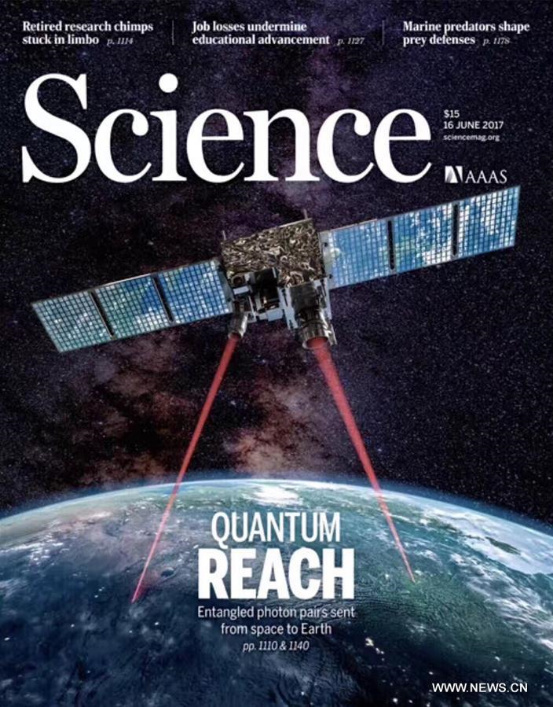By Tom McGregor, CCTV.com Panview commentator and editor
The scientific term - quantum physics - sounds complex and few people really understand it. For-the-record, quantum physics is defined in Collin's English Dictionary as: The smallest quantity of some physical property, such as energy that a system can possess according to the quantum theory.
A photon could be deemed as a particle of the smallest quantity that can be examined by quantum physicists in order to launch experiments and conduct testing to make major breakthroughs in the field.
Accordingly, a team of Chinese scientists from the University of Science & Technology of China (USTC) in Hefei have launched a quantum satellite project to explore photon entanglements at long distances.
Photon-pairs go the extra mile
On June 16, 2017, Pan Jianwei, chief scientist of the project known as the Quantum Experiments Space Scale (QUESS), announced his team had set a long-distance record for realizing satellite-based distribution of photon entangled pairs at over 1,200-km.
Last August, QUESS launched a satellite, dubbed - Micius, named after a Chinese philosopher from 5th Century BC., demonstrating an ability to entangle photons at long distances has impressed the international science community as well.

Photo shows the U.S. journal Science with a cover story about a major technical breakthrough towards quantum communication over great distances by Chinese scientists. (Photo from Xinhua/Jin Liwang)
"There is a worldwide race in quantum technologies and China is the first to take it into space and in spectacular fashion," USTC news website quotes Professor Andrew White, director of the Australian Centre of Excellence for Engineered Quantum Systems, as saying.
White added, "They (China) have set the standard for Europe and North America to aspire to."
Entangled particles can pave a path for the key distribution mechanism that would achieve secure and hack-proof information technology (IT) communications.
Communications without interference
Chinese scientists believe they can develop a new system of communications that is satellite-based with a quantum leap. Currently, most lines of communications, IT relies on fiber-optic cables.
Quantum communications could run faster. If the quantum satellite project is successful, Chinese embassies and consulates all over the world can communicate without interference from hackers.
"The goal of our community is to build a quantum Internet," said Professor Lu Chaoyang from the University of Science and Technology of China," Today, our networks are protected by mathematics, but a quantum network will be protected by the law of physics."
Lu added, "It will be ultra-fast and ultra-secure."
QUESS has already made remarkable achievements in less than a 12-month time-frame since launching the Micius satellite. Experts believe quantum networks could replace present-day communications technologies.
IT transformation goes into orbit
QUESS conducted the photon entanglement experiment through two satellite-to-ground downlinks with total length ranging from 1,600-km. to 2,400-km.
A photon entanglement occurs when twin photons are separated from each other but the action of one photon still impacts the movement instantly of the other one even at a far distance.
The world-renowned scientist Albert Einstein described the quantum entanglement phenomenon in 1948 as "spooky action at a distance."
Xinhua News Agency likens it to two pieces of paper set apart, but if somebody writes words on one paper, it will immediately appear on the other one.
The mystery of quantum entanglement has puzzled scientists since its detection. Nevertheless, Chinese scientists working on QUESS appear to be untangling mystery and bursting new ground in the field of quantum physics.
"If you want to explore new physics, you must push the limits," said Pan Jianwei.
Satellites for a new era
QUESS has pursued a satellite-based approach to photon entanglement, which makes it easier to cover to distant locations on Earth.
The three ground stations that were involved in the project were the Delingha Observatory - Qinghai Province, Nanshan Observatory - Xinjiang Ugyur Autonomous Region and Gaomeigu Observatory - Yunnan Province.
The orbiting satellites could only be tested for five minutes each night, when they were in visual range - 500-km. above two ground stations.
According to Xinhua, to optimize link efficiency, Chinese scientists had combined a narrow beam divergence with high bandwidth and high-precision acquiring, pointing and tracking (APT) technique.
QUESS had to ensure the optic axis of the satellite was precisely pointed towards telescopes posted at the ground stations. Achieving success was no easy task.
"It is like tossing a coin from a plane at 100,000 meters above sea-level exactly into the slot of a rotating piggy bank," said Wang Jianyu, QUESS chief commander.
Successful endeavors with long-lasting impact
Despite the challenges, QUESS had already set a long-distance record for photon entanglement. No other quantum physics science teams from either Europe or North America have come close to accomplishing similar results.
The Hefei-based QUESS team will continue to pursue excellence and innovations. They are already setting up plans to launch another quantum satellite, with major upgrades, within two years.
Quantum networks can break boundaries for more enhanced IT communications. One could imagine a day in the future when fiberoptic cables are no longer necessary to set up phone lines or to open up the Internet.
Quantum communications is not yet ready for commercial use, since more development is necessary but QUESS has made huge strides to set the stage for more secure and faster communication networks system.
(The opinions expressed here do not necessarily reflect the opinions of Panview or CCTV.com)

Panview offers a new window of understanding the world as well as China through the views, opinions, and analysis of experts. We also welcome outside submissions, so feel free to send in your own editorials to "globalopinion@vip.cntv.cn" for consideration.
















